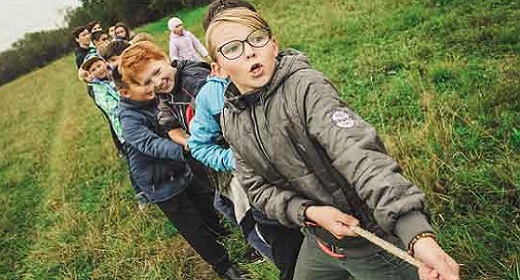by Jennifer Landis: Many new parents erroneously believe that social skills develop naturally in children without any guidance…
However, social skills, like any other skill, develop with practice. Fostering healthy social skills in children requires the intervention of parents and caretakers.
While some children exhibit what seem like fixed personality traits such as a tendency toward shyness or gregariousness, all children can and must learn how to clearly communicate with others and navigate their way through difficult interactions. Aiding children in skills such as showing empathy toward others and assertively stating their desires prepares children for adult interactions and can, in some cases, keep children safer, as articulate, empowered children know how to explain to parents if someone else’s behavior becomes inappropriate.
While parents should guide children, helicopter parenting prevents children from learning how to assert themselves. Following these tips will help you in teaching social skills to your children without diminishing their own unique spark.
Show More Than Tell
How many of us grew up with parents who told us to do as they said, not as they did? While this sounds great in theory, in reality, children learn far more from imitating their parents’ behavior than they do from all the lectures in the world.
Therefore, modeling appropriate social skills in a variety of situations teaches children how to behave when faced with similar scenarios on their own. Parents should take care to avoid reacting in negative ways such as shouting whenever possible. Parents do well to model disagreements not as friendship-ending crises but rather a natural part of interactions between people with different ways of seeing the world.
Parents can also rehearse how to behave in certain situations before the actual interaction occurs. For example, parents can role-play with children to help them develop skills such as how to properly greet an adult, how to introduce themselves to other kids their age and how to keep a conversation going by asking open-ended questions.
Start Young
Ideally, introducing children to new people and social situations begins early when the child’s natural curiosity helps to overcome any potential fears of social interaction. Children of parents who limit their child’s social exposure often become timid and develop anxiety when in unfamiliar situations.
From the time children begin talking, parents should begin inviting more and more people into their youngster’s life. Whenever appropriate, children should be included, not excluded, from adult conversation. In addition, enrolling a child in preschool, vacation Bible school or summer camps helps kids learn how to interact with people their own age.
Include children in as many activities with people of different age groups as possible. Parents in diverse urban areas should also seize opportunities to have their kids interact with people from different cultural heritages. Doing so teaches acceptance of others even when they seem different.
Emphasize Empathy
What the world needs now may not be love, sweet love in the romantic sense, but fostering empathy in our youth will make tomorrow’s society a happier, healthier place to live. Young children see the world through a narrow lens and base everything around their sense of self. Teaching kids about the importance of honoring other people’s feelings allows them to realize that what hurts them, hurts others, too, and what makes them feel good will likely do the same for another.
Avoid shaming children into sharing or otherwise cooperating, however. Embarrassing children leaves them resentful and sullen as well as more hesitant about approaching similar future interactions. Instead of condemning a child’s behavior publicly, take them aside in private to explain why their actions can cause other people around them to feel bad.
Communicate Needs And Wants Effectively
Raising socially confident youngsters includes teaching them how to ask for what they want in positive ways. Children as young as four or five can begin learning the difference between behaving aggressively and behaving assertively.
Teaching kids to communicate their needs assertively helps keep them safer as well. For example, children with skill in communicating their needs assertively have a far easier time expressing to peers that a given activity, like climbing to the very top of the monkey bars at the park, frightens them. Because 70 percent of all playground injuries result from falling from equipment, kids who can vocalize an assertive, “No thank you,” to activities they feel unready for suffer fewer bumps, bruises and even broken bones.
In addition, teaching children that saying, “No,” to activities which make them uncomfortable, even when that means saying, “No,” to an adult, can help kids more successfully avoid child predators.
Foster Healthy Friendships
Parents of teenage children focus more on who their child associates with out of fear of things such as drug and alcohol abuse. But good parents spend the time to get to know their child’s friends from an early age.
Asking school-age children about whom they most enjoy spending time with and why assists children in choosing appropriate friendships. In addition, making children feel safe about addressing bullying behavior reduces the likelihood of them developing social anxiety.
Provide Varied Experiences
Children exposed to vastly different activities learn how to interact with the people they meet there. This empowers children to remain open to new experiences. Many adults become fearful in unfamiliar situations, and learning early how to imitate appropriate behavior lessens anxiety when children grow up and face tough social situations such as the first day on a new job.
Socially Savvy Kids Make for Well-Adjusted Adults
Exposing children to a variety of different situations with individuals of different ages and cultural backgrounds provides a firm foundation for a healthy, active social life when they reach adulthood. Instilling children with social confidence ensures they’ll adapt well and behave appropriately in any situation they encounter in life. Giving children the ability to handle even difficult social situations makes the best gift of all.





















































